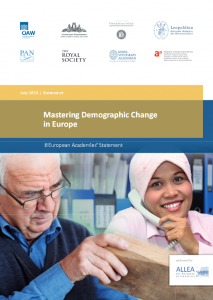Academies issue recommendations on “Mastering Demographic Change in Europe”
ALLEA supports the joint statement “Mastering Demographic Change in Europe” published by 8 European Academies of Science in order to address the policy challenges driven by significant demographic developments currently taking place in Europe. The statement offers research-based recommendations to encourage well-informed European Union policymaking grounded in an understanding of the causes and outcomes of demographic change.
As Europe’s population ages and lives longer lives, its fertility rate is falling. Europeans are increasingly migrating within the European Union, while a rising number of non-EU citizens are also immigrating to EU countries. These developments, combined with global changes such as climate change, natural resource shortages, as well as economic and social challenges, require careful planning on the part of EU policymakers in order to ensure a high quality of life for future generations.
Professor Günter Stock, President of the Federation of All European Academies (ALLEA), states: “European values on how to combine work and family life, how to use the individual potential throughout the longer lifespan, and how to best integrate and accommodate migrants vary significantly. From a scientific point of view, academies of science across Europe affirm that it is neither the number of children or of immigrants nor of life years per se, but the quality of living in sustainable conditions we need to improve. This is the direction of reconciling demographic change processes with economic, social and environmental conditions.”
The statement calls for a systematic, life-course approach towards understanding how longer working lives need policies that allow for more flexible movement between the spheres of education, career, and family. Moreover, the statement emphasizes that European citizens need the support of both EU and national policymakers for the successful management of longer working and post-retirement lives, the maintenance of productivity and quality of life levels beyond economic employment, and sustainable consumption.
Eight European Academies of Science have contributed their knowledge on demographic change and its causes and consequences to this statement. The full statement can be accessed here. For more information, please click here.



